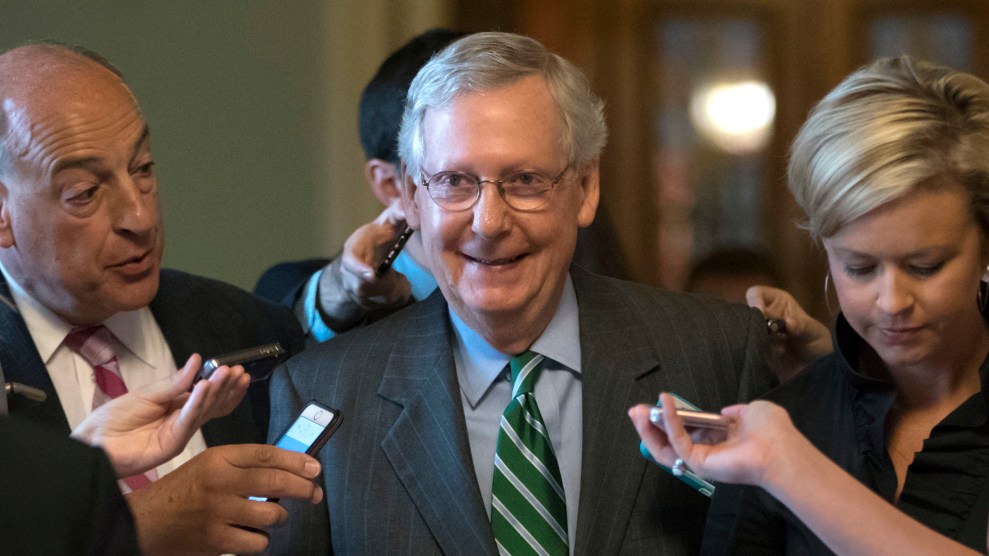This January, Jeff Jeans, an Arizona small business owner and cancer survivor, confronted House Speaker Paul Ryan (R-Wisc) at a town hall meeting broadcast on CNN. “Thanks to the Affordable Care Act, I’m standing here today alive,” he told Ryan. Why then, Jeans asked, would “you repeal the Affordable Care Act without a replacement?”
“We wouldn’t do that. We want to replace it with something better,” Ryan replied before talking about his mother-in-law’s bouts with cancer. “People just have these things,” Ryan said. “And we don’t want people to go poor or go bankrupt because this thing happens to them.” Instead of Obamacare’s exchanges, Ryan said he would favor state high-risk pools to protect people with pre-existing conditions.
Six months later, Jeans, who is 54, worries that the replacement legislation crafted by Ryan and Senate Majority Leader Mitch McConnell (R-Ky.) would do just that. McConnell announced Tuesday that the Senate won’t be voting on his bill this week, but he plans to revive the effort next month when senators return from the Fourth of July recess.
The Senate bill would make it easier for states to waive Obamacare’s list of essential health benefits—10 categories of treatment that all insurance policies must cover, such as hospital stays, prescription medications, and mental health care. And by erasing essential benefits, states could end up removing annual and lifetime caps for those procedures, which limit out-of-pocket costs for consumers. The market could revert back to the pre-Obamacare days, when insurance policies would leave people unprotected when they need insurance the most.
Jeans learned that lesson first hand. His wife needed an operation before Obamacare went into effect. By the time they learned she had a “junk” policy that didn’t cover most of the cost of her hospitalization, it was too late. They ended up paying about $16,000 out-of-pocket for a $24,000 procedure, he says.
If the Senate bill becomes law, millions more would have no insurance at all. The Congressional Budget Office found that the Senate’s health care bill would leave 15 million additional people uninsured next year. By 2026, 22 million more people would lack insurance than under current law. Jeans believes the bill breaks Trump’s campaign promises to protect the elderly and people with pre-existing conditions. “Everything that’s come out of that Congressional Budget Office score is that they definitely don’t confirm those standards,” Jeans says. “They contradict them.”
Jeans used to oppose the Affordable Care Act, too. He’d volunteered for Ronald Reagan’s presidential campaigns and swore he’d never comply with Obamacare. That changed when he was diagnosed with cancer in 2012 and was given six weeks to live. He was uninsured and offered to pay cash for his treatment, but it was rejected by every radiology and chemotherapy office Jeans’ wife reached out to. Instead, he ended up obtaining a policy in a temporary high-risk pool created by the ACA, which he credits with keeping him alive. His chemotherapy and radiation started the day his insurance took effect. These days, he runs a Facebook page called Obamacare Saved My Life.
When it comes to the high-risk pools that Ryan favors, Jeans isn’t so optimistic. Obamacare devoted $5 billion to high-risk pools as a temporary measure to help people until the ban on preexisting condition discrimination in the regular insurance market went into effect in 2014. But those risk pools proved inadequate, falling far short on funds needed to cover people with preexisting conditions. Enrollment peaked at a little more than 100,000, and in March 2013 the program froze out new enrollees as it struggled to keep up with costs. Jeans was lucky to get into the pool before the freeze out. After the Obamacare exchanges launched in 2014, the high-risk pools became obsolete because people with preexisting conditions could buy any health care plan.
Jeans is simply asking Republicans not to take away people’s health care. “Americans shouldn’t be afraid that their health care is going to change every four-to-eight years,” he says. “Every American should have stability in their health care.”
















